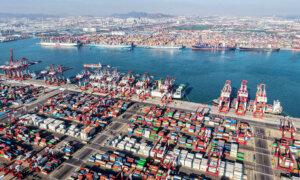‘The world has taken advantage of the United States for many years,’ Trump said from the Oval Office.
WASHINGTON—President Donald Trump said on Feb. 12 that he would soon unveil his highly anticipated “reciprocal tariffs,” imposing levies on a wide range of countries, as he had previously warned.
Speaking to reporters from the Oval Office, the president said that he might sign the reciprocal tariffs later that day or the following morning.
He noted that he delayed the announcement to avoid overshadowing Tulsi Gabbard’s nomination as his director of national intelligence.
“I don’t want to take anything away from this young lady’s day, because this is her day,” Trump said. “I may do it later on, or I may do it tomorrow morning, but we’ll be signing reciprocal tariffs.”
These comments came during Gabbard’s swearing-in ceremony at the White House.
“The world has taken advantage of the United States for many years. They’ve charged us massive tariffs that we haven’t charged them,” Trump said.
He criticized his predecessor President Joe Biden for allowing other countries to take advantage of the United States.
“He should have looked at the countries, both friend and foe, taking advantage of us. So, we’re going to be doing reciprocal tariffs, which is whatever they charge, we charge very simply,” Trump said.
On Feb. 10, Trump imposed 25 percent levies on all steel and aluminum imports, which are set to take effect on March 4.
The president imposed an additional 10 percent tariff on Chinese goods, effective Feb. 4.
Meanwhile, he agreed to a 30-day pause on 25 percent tariffs on Canadian and Mexican goods, giving both countries time to implement measures to curb fentanyl trafficking into the United States.
Following the steel and aluminum tariffs, some world leaders have criticized the decision.
“The EU will act to safeguard its economic interests. We will protect our workers, businesses, and consumers.”
Both the Trump and Biden administrations have accused China of dumping cheap steel on the global market. In May 2024, Biden further raised tariffs on Chinese steel and aluminum to reduce exposure to dumping and protect U.S. producers.
In a fact sheet on Feb. 11, the White House defended the new steel and aluminum tariffs, stating that China exploited loopholes created by exemptions granted to certain countries in prior years, making previous steel and aluminum tariffs ineffective.
As a result, Trump is now imposing tariffs universally on all countries, giving no exemptions.
“By granting exemptions to certain countries, the United States inadvertently created loopholes that were exploited by China and others with excess steel and aluminum capacity, undermining the purpose of these exemptions,” the fact sheet stated.
Some economic observers raised concerns that the new administration’s tariff plans could raise inflation again.
The January consumer price index (CPI) report revealed that the annual inflation rate rose for the fourth straight month, touching 3 percent, the highest since June 2024.
The data reflected broad-based increases, with energy, shelter, and food driving the hotter-than-expected jump.
Whether the latest inflation data will push the White House to slow down its tariff plans remains to be seen.
However, while the recent jump has been unrelated to any tariff activity from the current administration, a chorus of experts is debating whether universal or targeted levies could keep price pressures intact.
“Both the record of history and economic theory are quite clear that tariffs are rarely, if ever, passed on in full to consumers,” economist EJ Antoni told The Epoch Times.
“Instead, some of the tax burden is shifted to foreigners.”
“We have long said that the president is using tariffs as a rhetorical/negotiating tactic. And, oh my, it is working. Let’s stop the handwringing. Tariffs were not inflationary round one. Let’s take a breath,” Nancy Tengler, CEO of Laffer Tengler Investments, told The Epoch Times.
But consumers are worried that Trump’s tariffs will stoke inflation.
The University of Michigan’s Consumer Sentiment Index highlighted that the one-year inflation outlook was above 4 percent.
Still, recent developments could make the Federal Reserve’s job harder to restore price stability and return inflation to the central bank’s 2 percent target.
“The Fed is also watching the impact of higher tariffs, more restrictive immigration policies, and tax cut plans,” Bill Adams, chief economist at Comerica Bank, said in a note emailed to The Epoch Times.
“These policies could all add to inflation as their effects ripple through the economy, causing the Fed to keep interest rates higher than they would have been under the status quo.”
Federal Reserve Chair Jerome Powell addressed these policy changes, noting that the central bank would assess the general effect on the economy.
“This is a fairly uncertain environment right now. The underlying economy is very strong, but there is some uncertainty out there about new policies,” Powell told the House Financial Services Committee during his Feb. 12 semi-annual monetary policy report.
Original News Source Link – Epoch Times
Running For Office? Conservative Campaign Consulting – Election Day Strategies!


